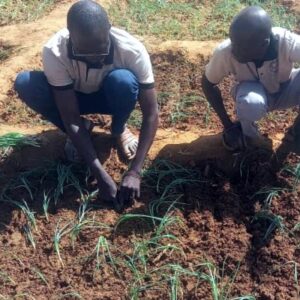The Friends of A Rocha Network
The Network currently includes 32 Friends around the world:
Check here whether your group or organization is eligible to join the Network
Bolivia: Punto de Gracia Church
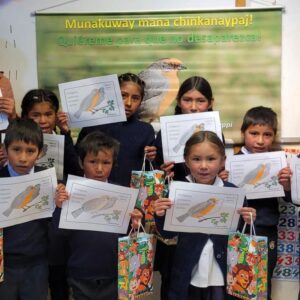
Punto de Gracia Church in Cochabamba, Bolivia takes the whole gospel to impoverished communities in the Andes: distributing the Bible in Quechua, supporting health care, basic human needs and education, and bringing awareness to the very special, endemic, and threatened Cochabamba mountain finch Poospiza garleppi through environmental education and research.
Find Punto de Gracia on Facebook.
Brazil: Centro Gênesis
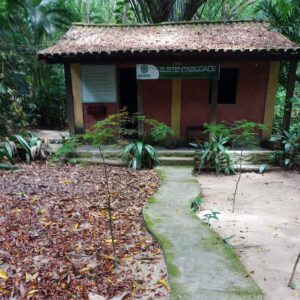
Centro Gênesis is also active in the field of conservation, restoring the forest cover where it is located, with an emphasis on more than a thousand specimens of Brazilwood Paubrasilia echinata. The results have already been published in Brazil and Mexico.
Find Centro Gênesis at www.centrogenesis.com.br and on Instagram.
Brazil: EcoVila Teshuvah
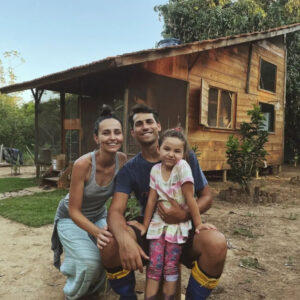
Building upon years of previous relationship with the river and its people, in 2020 Camila and Bruno Landim started EcoVila Teshuvah. The eco-friendly church building is made of bamboo and other local materials. Permaculture and literacy are taught as part of Christian discipleship. They’re looking at ecotourism and agroforestry to relieve the pressure on the river’s ecosystem, and host volunteers and Mission school interns who leave with a deeper understanding of integral mission.
For part of the year, the Landim family are back in the city, where they preach in traditional churches on the theology of creation care.
Follow EcoVila Teshuvah on Instagram.
Brazil: FEPAS
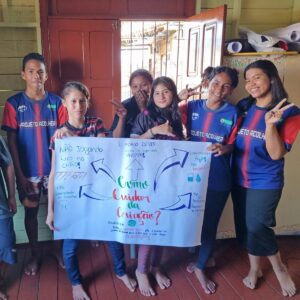
FEPAS continues using the environmental education manual which it co-published with A Rocha Brazil in 2015 (curriculum, teachers’ manual). Every project federated in FEPAS has a commitment to teach these materials every 2-3 years, to reach new cohorts of children and young people in their constituency.
Find FEPAS on www.fepas.org.br and follow them on Instagram, YouTube, and Facebook.
Brazil: Reserva Ecológica Verdes Pastos (Green Pastures Nature Reserve)
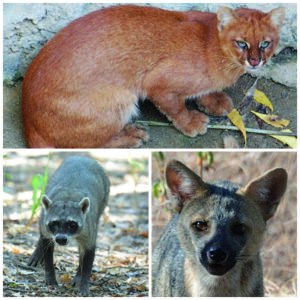
Green Pastures actively supports research by scientists and students from Campina Grande Federal University and runs regular guided trails for schools, churches and community groups. They monitor local wildlife using surveys and camera traps, and share the results on Facebook.
Find Verdes Pastos on Facebook: www.facebook.com/ReservaVerdesPastos
Brazil: Project The Way
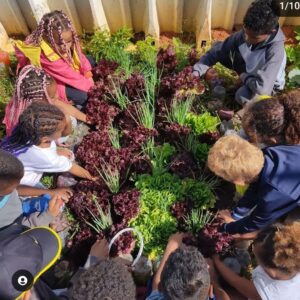
The Way seeks to promote a better world by raising the quality of life of children and youth in situations of social vulnerability through education, sustainability, culture, leisure, sports and faith. Under the guidance of the verse “Do everything in love (1 Cor 16:14)”, they work in partnership with local stakeholders through the training of trainers, themed workshops and urban gardening clubs.
The urban gardening clubs are agroecological spaces / moments that aim to instigate resistance and insistence on rethinking territories in a way that values conservation, people and sharing, countering excessive accumulation, violence and exclusion. In short, caring for all creation.
Follow The Way at www.projecttheway.com.br and on Instagram.
Burundi: SHINE Burundi
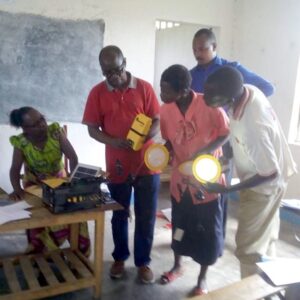
SHINE was founded in 2002.
Cameroon: African Alliance for Developmental Action (AADA)
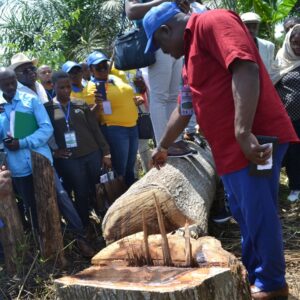
AADA has carried out conservation education, monitoring mangrove forests, and monitoring bush meat and non-timber forest product trade. Currently it’s focusing on combatting the illegal hardwood trade through environmental crime training sessions for magistrates, government workers, and community leaders, the promotion of non-timber forest products, and the collection of tree samples to improve product traceability and indirectly help with environmental crime prosecutions.
Due to the ongoing civil war, AADA has relocated to Yaoundé, where they are also helping with the Jesuit University Centre and planning education sessions on Laudato Sì’.
Cameroon: Light For Nature
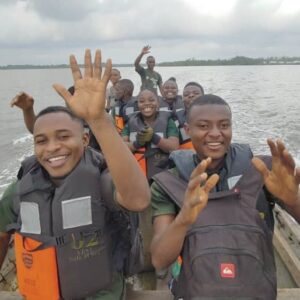
They are currently engaged with a mangrove replanting project in several communities in the Maberta–Bimbia creek, and in clean up from plastic waste in rivers, beaches, and other coastal ecosystems. They regularly collect plastic from rivers which pass through the Limbé Botanical Garden, considered the second largest garden in Africa.
Although headquartered in the English-speaking Southwest Region of Cameroon, Light For Nature’s members speak both English and French. They aim to be an instrument of peace within the country by acting towards nature conservation both in the Anglophone and the Francophone regions, particularly in the Douala region.
You may find them on www.lightfornature.org and on Facebook.
Canada: Villa de Brome
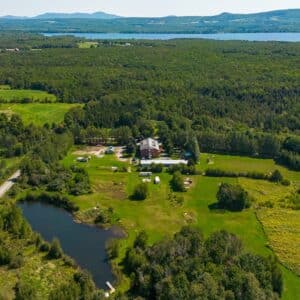
It offers a space for inner peace with chaplaincy and pilgrimages, in a spirit of openness and respect. True to its mission, the Villa preserves the environment while providing a harmonious, accessible, and welcoming place for retreats, nature stays, or events.
A diversified agricultural project (fruits, vegetables, herbs, trees) and the development of trails and retreat areas will allow visitors to discover the wonders that the Creator has entrusted to us.
Find them at villadebrome.com and on Facebook.
Central Asia: Plateau Perspectives
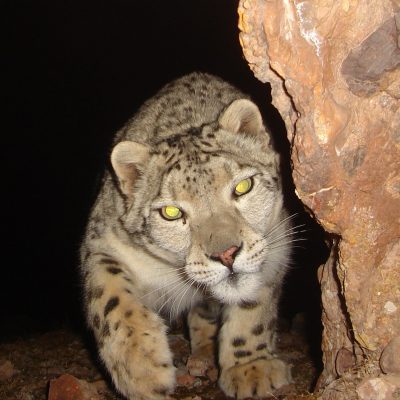
Plateau Perspectives has five distinctive characteristics:
- Integrating biodiversity conservation and community development;
- Developing partnerships with local communities, government and NGOs;
- Considering local and global environments, cultures, and knowledge systems;
- Aiming to develop successful, replicable models of development;
- Seeking to achieve sustainability in all fields of work.
Find Plateau Perspectives at plateauperspectives.org and on Linkedin, Facebook, Twitter, and Instagram.
Chile: Fundación Retoño
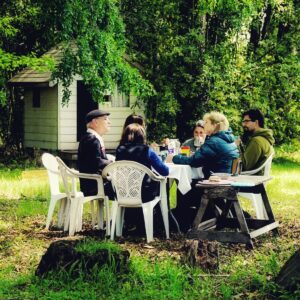
Based in the Araucanía region of southern Chile, the foundation works in partnership with schools, churches and university groups to create spaces and activities to care for local people and ecosystems.
Currently the organisation works in three areas. Through hospitality, hosting people in the ‘Casa Retoño’ where a simple lifestyle is modelled, sharing the kitchen and the table, creating retreats of contemplation and rest. Through environmental education, offering workshops for various groups and ages, at their premises or visiting groups in their cities, to learn about the nature that surrounds us and reflect on our role as stewards of this wonderful planet. Through conservation, managing an orchard and a small-scale nursery of native trees for reforestation.
Find them on https://retono.cl/ or on Instagram.
Croatia: Nada za ljude i prirodu (‘Hope for people and nature’ – HPN)
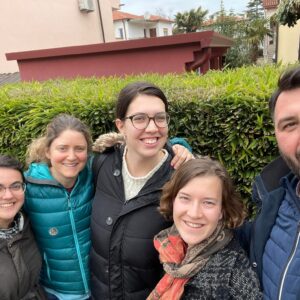
They organized and hosted an international creation care conference in June 2022, and are planning coastal and river clean-ups and a Christian organic farming community, as well as looking at a practical project for children’s Sunday school education.
Find them on Instagram or Facebook, and sign up for their emails.
DR Congo: Ministère de la Vie Chrétienne
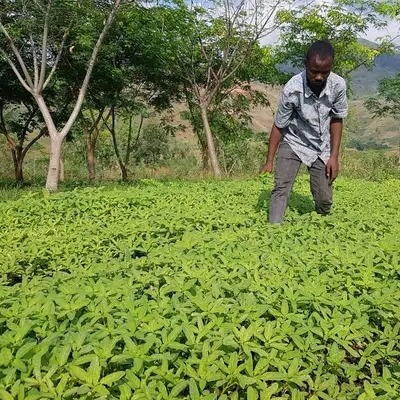
- Tree planting, through their ‘One Christian, One Tree’ initiative, to combat the very serious erosion problem on the steep, urbanized hills;
- Cleaning up the shores of Lake Tanganyika, removing waste from the lakeside communities, and raising awareness for Waste Recovery, Recycling and Reuse;
- Reducing human-hippopotamus conflict by sensitizing the local population to stay away from hippo breeding grounds, and encouraging the community to alert the authorities in cases of hippo poaching.
DR Congo: TRAFFED
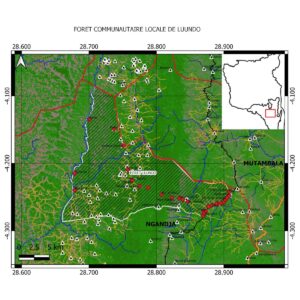
Ecuador: Grupo Guacamayo Ecuador
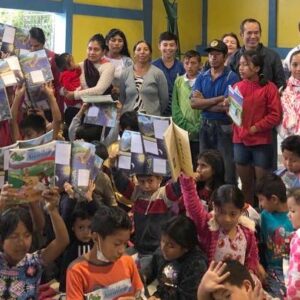
Germany: Hoffnung für Mensch und Natur (‘Hope for people and nature’)
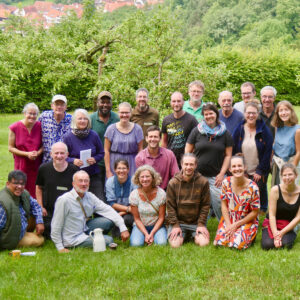
Hoffnung have been sending regular newsletters informing about Creation Care activities and events, and about A Rocha International, since 2015. They’ve been getting the word out in churches and Christian events, notably by participating in the Freakstock Festival since 2013, where they’ve been leading Creation Care workshops, field outings, and consulting for the festival on environmental issues such as the implementation of a reuse system for dishes and cutlery.
They are forming regional and thematic workgroups in several areas such as an ‘Exploring creation’ project, Creation Care Theology, Communications, Prayer, and Food and Agriculture.
Find them on Instagram and Facebook, and see their email contact details.
Guinea: AGIB
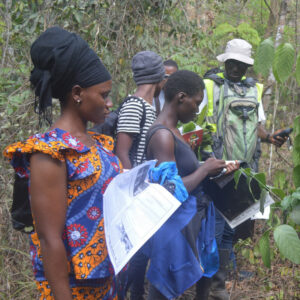
AGIB was started in 2022 as a response to the progressive loss of the Guinean montane forests and Western Guinean lowland forests, the advancement of the savanna, the drying up of watercourses and the impoverishment of soils in the region of N’Zérékoré.
Its leaders are putting their own knowledge in climate change, biodiversity, and ecosystem services in addressing these issues. Actions planned include setting up Nature Clubs in village schools, raising awareness on deforestation, living hedges, and insect pollinators, and developing sustainable income generation as an alternative to detrimental land management practices.
Indonesia: YAPPENDA
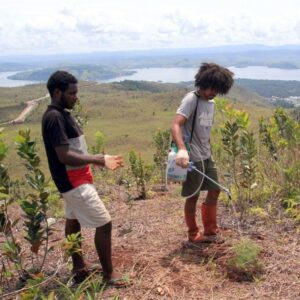
- Land reforestation, including setting up nurseries to grow tree seedlings for planting and establishing community forests for sustainable use;
- The creation of a learning centre for educational programs and to support research, including collaboration with both Indonesian and foreign universities.
Find them at yappenda.eco, Instagram, and Bluesky.
Madagascar: Natiora Ahy
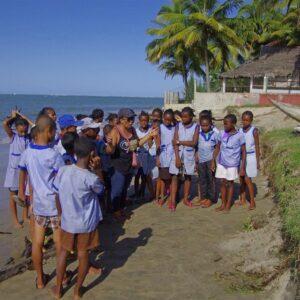
More recently, Natiora Ahy also started work inland in Madagascar’s central region, with a river clean-up activity called “Waters of hope, not plastic” and an environmental education programme with two Catholic schools.
Mozambique: Faith and Hope
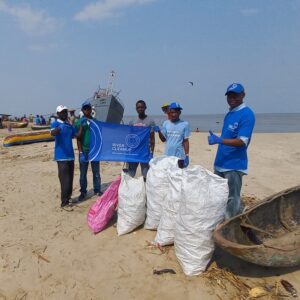
Founded in 2021, Faith and Hope is dedicated to promoting sustainable, equitable, and participatory development, as well as social welfare and social justice.
In 2023, Faith and Hope collected over 1,000 kg of plastics. They also raised awareness about the health risks of plastics and the link between plastics and climate change. They trained more than 40 people on how to work to end plastic pollution in their own communities, educated more than 200 people through their campaigns, and their speakers group (consisting of staff and volunteers) have given presentations to more than 110 people.
Faith and Hope is looking at expanding its coastal conservation work from clean-ups to mangrove planting.
Connect with Faith and Hope on Facebook.
Nepal: The Christian Union of Gaumukhi and Dhorpatan (CUZ)
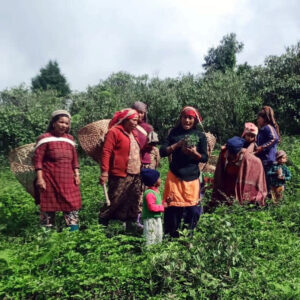
Panama: Huellas Panamá
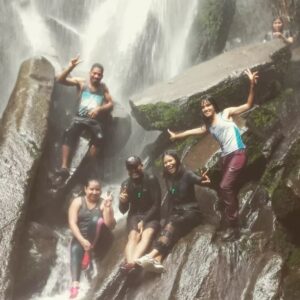
Rwanda: Global initiative for Environment and Reconciliation (GER)
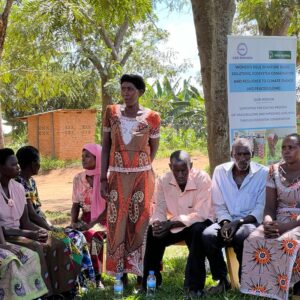
They have carried out a review of traditional knowledge associated with conservation, hosted an international event on connecting community seeds, culture and nature. Currently, GER is collaborating in a programme connecting agroecology, biodiversity conservation for community resilience, healing and peace with the communities in Ruhango, and partnering on a project on Gender and Climate, and also in the campaign My Food Is African: Healthy Soil, Safe Foods And Diverse Diets.
Find GER on globalr.org and follow them on Facebook and X/Twitter.
Rwanda: TIDA
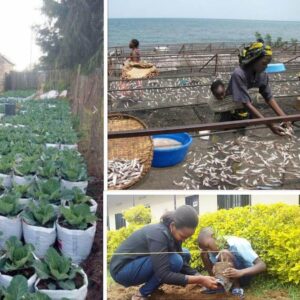
- Inland Water Body Conservation, looking at preventing pollution, promoting sustainable fishing, addressing water quality, and educating on water conservation.
- Enhancing soil productivity by mitigating soil loss through the application of organic manure in both grazed and cropped areas, and establishing sustainable agricultural practices.
- Ndi Umudigitale (‘Be Digital’) Project, focusing on digital literacy education to reduce paper use, thereby reducing emissions from paper production-related deforestation.
- CBC (Child In Biodiversity Conservation) Project, an environmental education programme for rural children which includes Biblical Education on Environmental Stewardship, Fundraising for Conservation through community events, and partnerships, and hands-on activities focused on biodiversity conservation, such tree planting, habitat restoration, wildlife monitoring, and other age-appropriate activities that foster a direct connection with nature.
Find TIDA on www.tidarwanda.org and follow them on Facebook and Instagram.
Spain: Centro Evangélico Cascadas
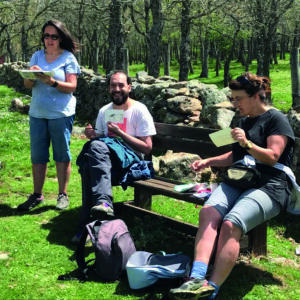
Sri Lanka: Kaveri Kala Manram (KKM)
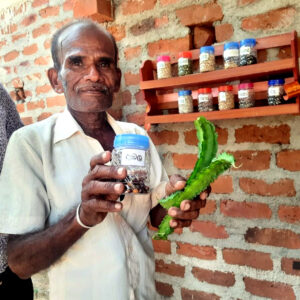
Taiwan: City to City Taiwan
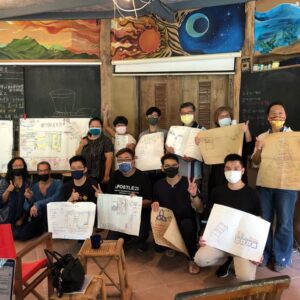
Zambia: Zambian Institute of Agriculture
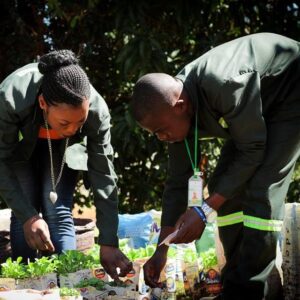
International Friends
Christian Camping International
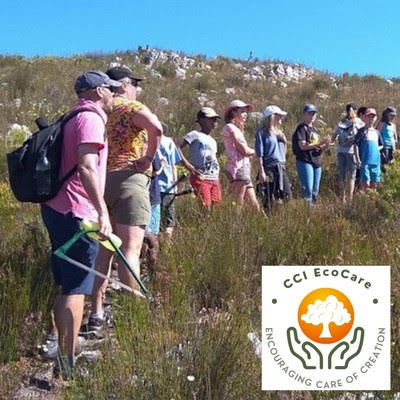
ECHO
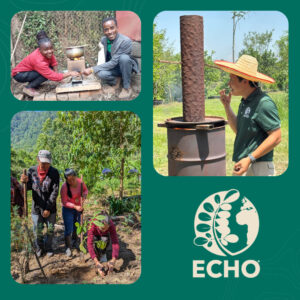
ECHO is a Christian organization serving small-scale farming families facing chronic hunger around the world. We build and serve a global network through our Regional Impact Centers and seed banks, partnering with the church, missionaries, pastors, and development workers to provide low-cost, practical, and locally adapted agroecological strategies. Rooted in the gospel, our mission is fueled by a commitment to restoration of land, lives, and hope.
Among ECHO’s various activities, our seed banks and plant nurseries focus on indigenous species that meet local culinary and cultural preferences and support reforestation efforts, including high-value species that have been overharvested in the wild. ECHO Regional Impact Centers utilize and train others in valuable techniques that sequester carbon and/or reduce carbon emissions, such as biochar and fuel-efficient rocket stoves. Soil conservation, watershed, and invasive management are key to the agroecological approach of ECHO at a system level.
Learn more about our mission and vision at echonet.org, explore resources at echocommunity.org. Connect with us on Instagram and Facebook.
SIL International
